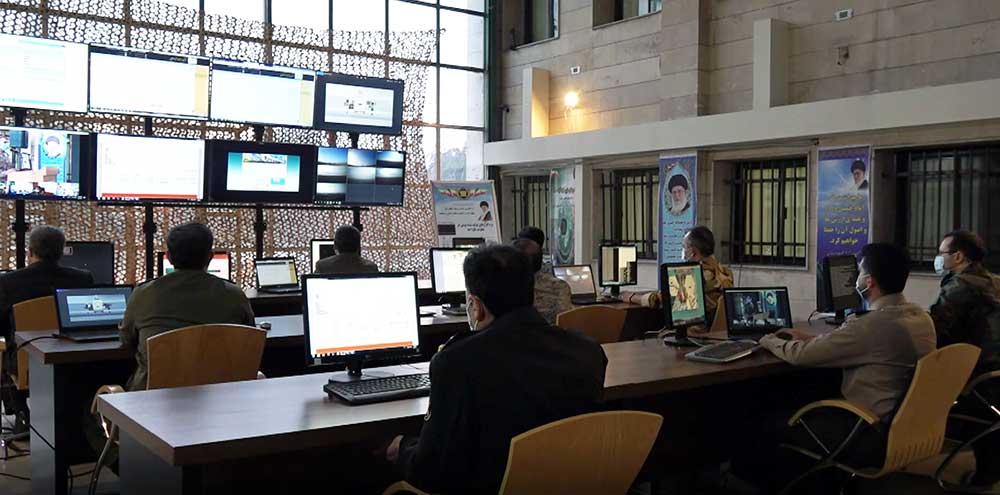The cyber defense drill codenamed Fath-1, or victory in Farsi, has been conducted in Iran with the aim of strengthening the country's protection against cyber threats.
“Ignoring the importance of cyber security can cause damage to combat capability, so the issue of the development of cyber defense has been put atop agenda of Iran’s Army in order to maintain and increase the combat capability,” Deputy Coordinator of Iran's Army Rear Admiral Habibollah Sayyari said during the joint cyber defense military exercise on May 18, according to the ISNA news agency.
He went on to say that enhancing cyber security is considered to be one of the most effective ways to expand the army's combat capabilities.
Deputy Commander of the Iranian Army for Information and Communication Technology Brigadier General Nasser Mokhtarzadeh also said during the drill that assessment of strategic plans at the strategic, tactical, technical and operational levels, upgrading the planning power of decision-makers, assessing and developing the cyber defense capability of Iran and employing cyber officers alongside skilled elites to transfer know-how were among the aims of the exercise.
“Our young officers carried out defensive operations using local and global platforms and virtual groups of several hundred individuals,” Mokhtarzadeh said.
In August 2020, the General Staff of the Iranian Armed Forces warned in a statement that it would respond to any cyber threats firmly and decisively.
“It is clear that the Armed forces of the Islamic Republic of Iran reserve the right to react to any threat at any level in a firmed and decisive manner if any of the policies included in the present instrument may be violated by any state, group, or any other person or entity supported, controlled or directed by any state,” the statement said.
In January, the Iranian and Russian foreign ministers signed an agreement on cooperation between the countries in the areas of information and cybersecurity. The agreement covered key matters of mutual interest, including cybercrimes using information and communications technology, technical cooperation, pooling of international efforts for identification of criminals and combating "terrorism and reacting to computer incidents".
Iran has been a target of cyber attacks over the years, with many threats made to its nuclear facilities. In June 2010, Iran was the victim of a cyber-attack when its nuclear facility in Natanz was infiltrated by the cyber-worm “Stuxnet”, which was reportedly created by the United States and Israel.
Stuxnet destroyed over 1,000 nuclear centrifuges, spreading beyond the plant to allegedly infect over 60,000 computers, and "set Tehran's atomic program back by at least two years". No government has claimed responsibility for the worm.
In October 2013, Mojtaba Ahmadi, who served as commander of the "Cyber War Headquarters" was found dead wounded by bullets in Karaj. In November 2018, the Iranian telecommunication minister Mohammad-Javad Azari Jahromi accused Israel of a failed cyber attack on its telecommunications infrastructure, and vowed to respond with legal action.
On April 11, 2021, Iran’s Natanz nuclear facilities experienced a blackout after a large explosion destroyed the internal electric grid that supplies its underground uranium enrichment centrifuges. According to initial reports, the cyber attack was carried out by Israel, but later Iran revealed that the damage actually resulted from a physical attack conducted by a suspect that the Iranian state identified as Reza Karimi.







 Russian peacekeeping forces, deployed in the Karabakh (Garabagh) region of Azerbaijan since 2020, have commenced their withdrawal from the area.
Russian peacekeeping forces, deployed in the Karabakh (Garabagh) region of Azerbaijan since 2020, have commenced their withdrawal from the area.
 The number of evacuees from flooded areas in Kazakhstan has reached 97,852 people, including about 32,856 children since March 27.
The number of evacuees from flooded areas in Kazakhstan has reached 97,852 people, including about 32,856 children since March 27.
 Azerbaijan officially unveiled the logo for the upcoming 29th session of the Conference of the Parties to the United Nations Framework Convention o...
Azerbaijan officially unveiled the logo for the upcoming 29th session of the Conference of the Parties to the United Nations Framework Convention o...
 The Kazakh authorities have increased their arbitration claims against international oil companies involved in the development of the Kashagan oil ...
The Kazakh authorities have increased their arbitration claims against international oil companies involved in the development of the Kashagan oil ...



